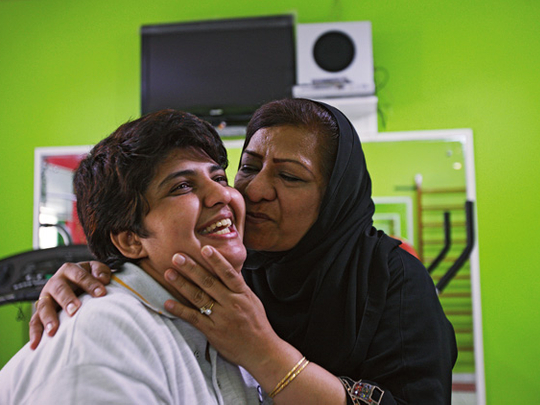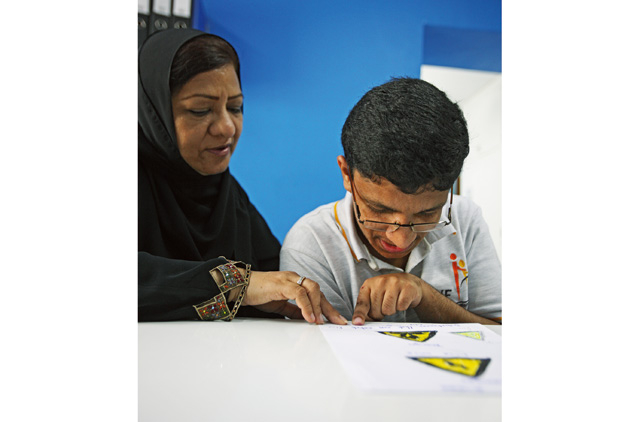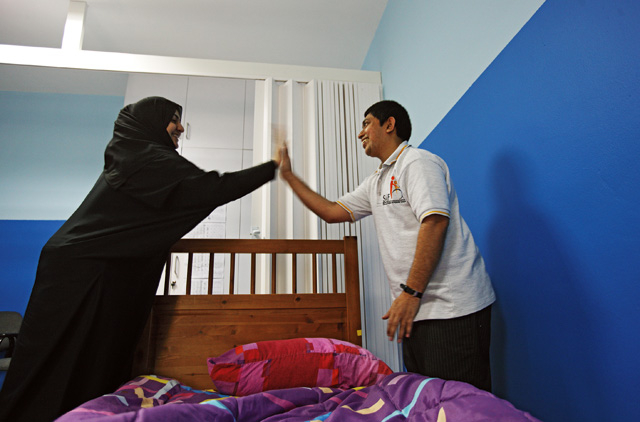
Hima Rosemary wakes up at her home in Al Qusais at 6am, has breakfast, grabs the lunch box her mother has prepared for her and sets off with her father, who gives her a lift to Rashidiya station. She takes the metro to Dubai Marina, from where her office is just a ten-minute walk. Not a big deal, you might say. But for the 24-year-old and her well-wishers at the non-profit Special Needs Future Development Centre in Karama, Dubai, it's a major achievement.
Until three years ago, Hima, who was diagnosed autistic as a child, had to be cossetted and coaxed into doing everyday activities.
But the care and education lavished on her at the centre paid off when, a year later, she gathered enough independence to take up an office-receptionist role.
"She's become so confident that her job description keeps increasing every day," says Safia Bari, 52, director of SNF. "She picks up things very quickly now. She received a bonus recently from her company - Daga Chemicals - and last week came to our centre with a huge box of chocolates plus a donation of Dh1,000! Even though her family is not very well off, she insisted on giving us the money."
For Safia, seeing Hima thrive in her new job is proof that her goal on setting up the centre in 2007 was well-founded. With the aim of integrating special-needs students into society as independent and motivated individuals, "the idea was to prepare our students for mainstream life through personal management, functional academics and society participation for leisure-and-vocational skills development," says Safia. Today, Hima is just one of the good-news stories.
Born out of dark times
What started Safia, an Indian expat, on this quest was her own experience as the mother of a child with mild cerebral palsy. Nusrat, 29, was born with developmental problems. It took Safia a long time to come to terms with her eldest daughter's diagnosis.
"I didn't really accept the fact that Nusrat was different until she was almost eight," she admits. "I knew nothing about special needs, so when she was slow compared to her peers, I told myself it was because she was my first baby and she'd been pampered too much - even though I was a trained teacher."
After the realisation of her daughter's condition came a dark period when Safia blamed herself and searched frantically for answers. "It was difficult - I remember closing myself off from other parents because I was feeling so low. Nusrat was nine by then and a pupil at a special-needs school in Dubai."
A life-changing moment A chance encounter changed Safia's life. She explains that she met a parent at her daughter's school who had twins with special needs more difficult to manage than Nusrat's.
"She appeared so happy that I was ashamed of myself," she explains. "I remembered the saying ‘I wept because I had no shoes until I met a man who had no feet'. How true!"
Safia has two other children, Mehnaz, 25 and Saher, 20. While Saher is a Mass Communications student, Mehnaz, a qualified interior decorator, has chosen to help her mother at the centre.
Spurred on by the humbling encounter, Safia became actively involved in Al Noor Centre for Children with Special Need's volunteer programme. She held weekend open-house days for other parents and their special-needs kids at her house, and conducted a summer camp from her living room for children who couldn't go on holiday in summer.
In 2003, she established the Special Needs Families (SNF) support group. From just two families originally, SNF has grown to more than 150 today, compiled a database of facilities available in the UAE for special-needs children, has medical specialists who offer their services pro bono, a fund-raising division, a volunteer programme as well as many social activities for the 36 students. Challenges setting up the centreWhen Safia wanted to take the support group idea further and establish a proper school, she found the going rough.
"I wanted to have a villa with enough space to have some sort of running track and a pool for the children, but no one wanted to rent them out to a centre for special-needs children," she says.
"It's also very expensive and we depend on donations and sponsorship. We visited over 30 places but they refused because they were afraid of catering to children with special needs."
The SNF Children Development Centre, as it was called at the time, finally found a home at the Karama Centre building in Karama. It opened in 2007 with five students in an apartment, with the goal of providing a safe haven for children whose parents were unable to get them a place at one of Dubai's special-needs schools.
Now called the Special Needs Future Development Centre, today it teaches life skills to 36 special-needs students. There are 12 more potential students on the waiting list.
The centre's USP is that it is one of the few schools that caters to the adult population among special-needs people. "We have students ranging from 14 to 53," says Safia.
"In fact, the reason I started the centre is the question that haunts all parents of special-needs children: what happens after 18? Special-needs schools don't accept students over 18."
Safia today has the satisfaction of knowing that she's helping these beleaguered parents. "When Zulekha, 53, was brought to our centre by her sister, she hadn't been to a school in 40 years," says Safia. "She suffers from Down's Syndrome. When we were asked if we could help, we couldn't refuse. I asked her what she wanted to do, and she said ‘Write my name'. She couldn't read or write at the time. Now, she not only writes her name, she also does embroidery, and some art and crafts. She's such a loving woman."
The benefits have been closer to home too. Nusrat has started talking very fluently ever since she started going to SNF, says Safia. "She sees children who are more developed than her, and she picks up from them," she says. "So much so that now Fridays and Saturdays are a problem as she wants to go to the centre!"
Teaching independence
The students have varied problems. Some are slow learners, some suffer from Down's Syndrome, and some are also visually and aurally impaired. But a team of experts, including physiotherapists, a voice therapist and special education teachers, are on hand to give them individual attention. The ratio of teachers to students is 2:1 for autistic students.
The fees are nominal - Dh1,200 per month. Invariably, Safia has to find sponsors for those who cannot afford the fees.
"We recently took on a 13-year-old hearing-impaired boy, Abdul Rehman, even though they couldn't afford to pay." In just a few months, Abdul who earlier never used to smile, now has learnt to greet everybody and willingly participates in class activities," she says.
Asma Farooq, whose daughter, Suhana Shaikh, has been going to SNF since 2009, feels the friendly atmosphere at the centre makes all the difference. "My daughter, who has speech problems due to ADD (attention deficit disorder), has been to a few schools here. But there wasn't much progress. When it came to a stage where we couldn't afford the fees at the other schools we came to SNF, and what a change. She talks loads now. It's been a dream come true for us. Suhana wants to go to school even during the holidays now."
The reason? Safia and her staff teach the children more than just regulation lessons. They teach them basic skills that will allow them to be treated as adults.
"We concentrate on living skills; simple things like making their own bed, folding clothes, dressing up and grooming themselves," says Safia.
Later, when they are more confident, they are taught to do things around an office, such as filing papers, printing and laminating documents, and tagging goods with prices in a room mocked up with desks, a copier, files, and spiral binding and lamination machines.
The life skills continue in the fully equipped kitchen where the students are taught to make simple salads and sandwiches. The more adventurous ones are taught baking too. They also learn to make tea, wash dishes, set a table, iron clothes and do the laundry.
They are taught in a relaxed manner as the main goal is independence. There are no hard and fast rules, and each student learns at his or her own pace.
"The area is simulated to be like a real home to help them take care of themselves if their parents or helpers are not around," says Safia.
The centre even sets up mock food courts and markets, and has shopping days complete with stalls, which shows the students how to buy something and pay for it. This preparation with life skills stems from the realisation that not all students will get jobs, but they still need to learn basic survival skills.
Expanding facilities
With the addition of two more apartments, the centre now has 18 rooms.
While part of it is paid for from the fees, most of the expenses are met by sponsors, both corporate and individual. This has enabled the centre to broaden its activities.
An IT expert teaches students basic operations in a computer room. There is a gym with exercise cycles, treadmills and weight training machines, with a trained physiotherapist in charge.
Carpentry and screen-printing are taught, along with yoga, aerobics, music and dance. There is an arts and crafts room where students paint, draw and sculpt. And there's even provision to shred newspapers and waste paper, and then to recycle them into coasters, table mats and lampshades.
"The children even design and print posters, mugs, T-shirts and such other items for different companies, with help from volunteers," says Safia.
"This also helps them earn a small amount of money. The tremendous boost of confidence it gives them has to be seen to be believed."
It costs about Dh450,000 annually to keep SNF going. Safia banks on donations, on top of two major fundraisers the centre organises annually, usually in November. An annual painting exhibition of the works of the students also brings in much-needed funds. Both events are held at the Deira Sheraton Hotel, which provides the venue free of charge.
Apart from this, some large companies sponsor the centre sporadically. "Toshiba has been sponsoring us for the past three years," says Safia. "Organisations such as Barclays, DP World and Clifford Chance, Daga Chemicals and The One have all helped us on and off.
"The teachers and supporting staff are doing a tremendous job, but there is always a need for more volunteers," says Safia. "We especially need them during field trips and for fund-raising campaigns."
Safia has 5,000 volunteers on her mailing list, but only around eight turn up on a daily basis at the centre. "During our fund-raising activities, around 250 of them turn up, which is a great help for us," she says.
Many are regulars, like Hermie Sequeira, who has been volunteering at SNF since 2006. She goes there three days a week to help with fund-raising and other administrative work. "I am blessed to be able to help," she says. "These children have taught me to appreciate every little thing I have." Integrating into societyUltimately, SNF is about integrating the special-needs students into society.
"I don't let go of any opportunity to get my children out there, participating in whatever event that allows us to," says Safia. "Sports, cleanliness drives, safety campaigns - as long as it allows them to interact with other mainstream children, we'll be there." SNF arranges a wide variety of events for its students, from cruises to parties and picnics. "Things parents can't normally afford to do by themselves," says Safia.
These days out can be as helpful and meaningful for the parents of the special-needs kids as for the children themselves.
"Having a special-needs kid is a challenge - all the more so if the child has behavioural issues," says Safia. "The first time I organised a get-together of 350 people at a park, I remember there was this mother who was crying as we were finishing things up. It was because, although she had been in the UAE for five years, every time she had brought her child to the park, she had to turn back from the gates because of the attention her family attracted due to her son's behaviour. ‘Today I am not bothered even if a thousand people are staring at him. I am not the only one now,' she told me," says Safia.
"I was happy to hear that, and it also gave me the impetus to organise desert safaris, picnics, even movie outings for our children.
"Since then we've been seeing a lot more parents who'd previously been hiding their kids indoors, bring their children out and enjoy themselves. There's been no looking back for me after that first outing."
Making a difference
- Who: Safia Bari
- What: Special Needs Future Development Centre
- Where: Dubai
- How: Teaching life skills to special-needs people













